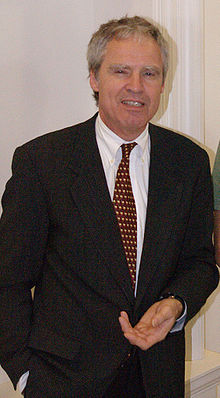| Horst Ludwig Störmer | |
|---|---|
 Störmer in 1998 Störmer in 1998 | |
| Born | (1949-04-06) April 6, 1949 (age 75) Frankfurt, Hesse, Allied-occupied Germany |
| Nationality | German |
| Alma mater | University of Stuttgart Goethe University Frankfurt |
| Known for | Fractional quantum Hall effect |
| Awards | Oliver E. Buckley Condensed Matter Prize (1984) Nobel Prize in Physics (1998) The Benjamin Franklin Medal (1998) |
| Scientific career | |
| Fields | Physics |
| Institutions | Columbia University Bell Labs |
| Doctoral advisor | Hans-Joachim Queisser |
| Doctoral students | Jun Zhu |
Horst Ludwig Störmer (German pronunciation: [ˈhɔʁst ˈluːtvɪç ˈʃtœʁmɐ] ; born April 6, 1949) is a German physicist, Nobel laureate and emeritus professor at Columbia University. He was awarded the 1998 Nobel Prize in Physics jointly with Daniel Tsui and Robert Laughlin "for their discovery of a new form of quantum fluid with fractionally charged excitations" (the fractional quantum Hall effect). He and Tsui were working at Bell Labs at the time of the experiment cited by the Nobel committee.
Biography
Störmer was born in Frankfurt am Main, and grew up in the nearby town of Sprendlingen. After graduating from the Goetheschule in Neu-Isenburg in 1967, he enrolled in architectural engineering at the TH Darmstadt, but later moved to the Goethe University Frankfurt to study physics, but since he had missed the registration period for physics, he began with a mathematics and later changed to physics, qualifying for his Diploma in the laboratory of Werner Martienssen. Here he was supervised by Eckhardt Hoenig, and worked alongside another future Nobel laureate, Gerd Binnig.
Störmer moved to France to carry out his PhD research in Grenoble, working in a high-magnetic field laboratory which was run jointly between the French CNRS and the German Max Planck Institute for Solid State Research. Störmer's academic advisor was Hans-Joachim Queisser, and he was awarded a PhD by the University of Stuttgart in 1977 for his thesis on investigations of electron hole droplets subject to high magnetic fields. He also met his wife, Dominique Parchet, while working in Grenoble. They divorced each other a few years later.
After receiving his PhD, Störmer moved to the US to work at Bell Labs, where he carried out the research that led to his Nobel prize. After working at Bell Labs for 20 years, he became the I.I. Rabi professor of physics and applied physics at Columbia University in New York City. He was elected to the American Philosophical Society in 2006. He retired as professor emeritus in 2011.
Störmer is a naturalized US citizen.
Research career
Perhaps as important as the work for which he won the Nobel prize is his invention of modulation doping, a method for making extremely high mobility two dimensional electron systems in semiconductors. This enabled the later observation of the fractional quantum Hall effect, which was discovered by Störmer and Tsui in October 1981 in an experiment carried out in the Francis Bitter High Magnetic Field Lab at the Massachusetts Institute of Technology. Within a year of the experimental discovery, Robert Laughlin was able to explain its results. Störmer, Tsui and Laughlin were jointly awarded the 1998 Nobel Prize in Physics for their work.
References
- ^ "Home page at Columbia". Archived from the original on 2012-12-20. Retrieved 2014-04-20.
- Stormer, HL; Tsui, DC (1983), "The Quantized Hall Effect.", Science, vol. 220, no. 4603 (published Jun 17, 1983), pp. 1241–1246, Bibcode:1983Sci...220.1241S, doi:10.1126/science.220.4603.1241, PMID 17769353, S2CID 17639748
- ^ Horst Ludwig Störmer on Nobelprize.org

- "APS Member History". search.amphilsoc.org. Retrieved 2021-05-21.
- "Horst L. Stormer | Biography, Nobel Prize, & Facts". 23 April 2024.
- "Horst L. Störmer".
- Nobel Prize press release
External links
- Horst L. Stormer Patents
- Honeywell - Nobel Interactive Studio
- Horst Ludwig Störmer on Nobelprize.org
 including the Nobel Lecture, December 8, 1998 The Fractional Quantum Hall Effect
including the Nobel Lecture, December 8, 1998 The Fractional Quantum Hall Effect
| 1998 Nobel Prize laureates | |
|---|---|
| Chemistry |
|
| Literature (1998) |
|
| Peace |
|
| Physics |
|
| Physiology or Medicine |
|
| Economic Sciences |
|
- 1949 births
- Living people
- Foreign associates of the National Academy of Sciences
- 20th-century German physicists
- Columbia University faculty
- Columbia School of Engineering and Applied Science faculty
- Nobel laureates in Physics
- Scientists at Bell Labs
- German Nobel laureates
- Oliver E. Buckley Condensed Matter Prize winners
- Goethe University Frankfurt alumni
- 21st-century American physicists
- American Nobel laureates
- Naturalized citizens of the United States
- Knights Commander of the Order of Merit of the Federal Republic of Germany
- Technische Universität Darmstadt alumni
- Fellows of the American Physical Society
- Members of the American Philosophical Society
- Scientists from Frankfurt
- Benjamin Franklin Medal (Franklin Institute) laureates
